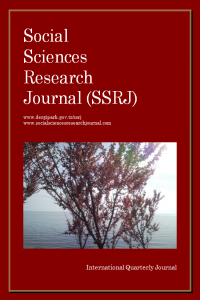Meslek Yüksekokulu Öğrencilerinde Üretim İşletmelerinin Kalitesinin Kurumsallaşma ve Performans Algısı Boyutuyla İncelenmesi
Meslek Yüksekokulu, Öğrenci, Kurumsallaşma Algısı, Performans Algısı, Üretim İşletmeleri, Vocational school, student, perception of institutionalization, perception of performance, production businesses
Investigation of the Quality of Production Businesses in Vocational School Students with the Dimension of Institutionalization and Performance Perception
Vocational school, student, perception of institutionalization, perception of performance, production businesses,
___
- Ağın, K. (2022). The importance of using total quality management and its instruments. Atlas Journal, 8, 2756-2765. Retrieved from https://atlasjournal.net/index.php/atlas/article/view/526.
- Ahmad M.F., Zakuan N., Jusoh A., Yusof S.M., & Takala J. (2014). Moderating effect of asean free trade agreement between total quality management and business performance. Procedia-Social and Behavioral Sciences, 129, 244-249. https://doi.org/10.1016/j.sbspro.2014.03.673.
- Akdemir, A., Mert Karagöz, A., Salihoğlu, G., Konakay, G., Adalı, P., Koçyiğit, E., & Zaimoğlu, Ö. (2015). Investigation on the effects of vocational school students career plans on motivation levels. Journal of Economics and Management Research. 4(1), 52-90.
- Aksoy, U.A., & Çabuk, A. (2006). The effects of TQM applications on institutionalization of small and medium enterprises. Balıkesir University The Journal of Social Sciences Institute, 9(16), 39-57.
- Balcı, E., Argon, T., & Kösterelioğlu, M.A. (2013). Views of vocational college students regarding school and work life. Kuram ve Uygulamada Eğitim Yönetimi Educational Administration: Theory and Practice, 19(4), 515-541.
- Bayraktar, T., & Güvenç, D. (2014). A study on determination for corporate social responsibility perceptions of vocational school students: Kandıra vocational school sample. Journal of Labour Relations, 5(2), 40-50.
- Canbolat, M. A., & Bedük, A. (2019). Investigation of entrepreneurship perception levels of vocational school students: Karamanoğlu Mehmetbey University VSSS sample. Journal of Current Researches on Social Sciences, 9(2), 187-196. doi: 10.26579/jocress-9.2.13.
- Doğan, S., & Çakıcı, C. (2022). Ethical issues towards artificially intelligent robots. Journal of Contemporary Tourism Research, 6(1), 162-176. https://doi.org/10.32572/guntad.1009648.
- Duysak, A. (2019). Relationship between the level of institutionalization and management information systems in businesses. Journal of Social, Humanities and Administrative Sciences, 2(12), 938–957. DOI:10.26677/TR1010.2019.281.
- Erdil, O., Kitapcı, H., & Turan, E. (2005). Effect of organizational culture on perception of quality and business performance. Journal of Economics and Administrative Sciences, 19(1), 259-273. Retrieved from https://dergipark.org.tr/tr/pub/atauniiibd/issue/2687/35306.
- Fuchs, E.P., & Anderson, J. E. (1987). The institutionalization of cost-benefit analysis. Public Productivity Review, 10(4), 25-33.
- Han, B., Tang, Y., & Yang, L. (2016). Public information and uninformed trading: Implications for market liquidity and price efficiency. Journal of Economic Theory, 163(C), 604-643. http://dx.doi.org/10.1016/j.jet.2016.02.012.
- Izvercian, M. Radu A., Ivascu L., & Ardelean B.O. (2014). The impact of human resources and Total Quality Management on the enterprise. Procedia - Social and Behavioral Sciences, 124, 27-33. DOI:10.1016/J.SBSPRO.2014.02.456.
- Kaya, A. (2014). Thoughts of Junior Technical College Students about their Training and Teaching and their Future. Ondokuz Mayis University Journal of Faculty of Education, 33(2), 349-356. doi: 10.7822/omuefd.33.2.1.
- Kırklıkçı, A.B., & Gedi̇k, T. (2021). Development study of perceived institutionalization and perceived performance scales. Drvna Industrija, 72(2), 131-142. https://doi.org/10.5552/drvind.2021.1972.
- Kırklıkçı, A.B. (2022). The impact of workplace spirituality on perceived ınstitutionalization and perceived performance. Karamanoglu Mehmetbey University Journal of Social and Economic Research, 24(43), 873-890.
- Küçük, O. (2013). Total Quality Management, 2nd. press. Ankara: Seçkin Publishing.
- Küçük, O., Dengel, D., & Çeven, S. (2019). ASI business performance scale development study: A field survey. International Erciyes Scientific Research Congress, Kayseri. pp. 583-594.
- Küçük, O., Yılmaz, E., Şen, H.İ., & Küçük, N. (2015). Effect of total quality management on business enterprise performance a practice in logistic sector. The Journal of Academic Social Science Studies, 34(2), 53-67. DOI: 10.9761/JASSS2638.
- Mete, H., Erdem, A., Uzal, G., & Hüyük, D. (2018). An investigation of technical sciences vocational school students’ views on education-teaching. HUMANITAS- International Journal of Social Sciences, 6(11), 191-203. DOI: 10.20304/humanitas.357490.
- Mowday, R.T., Porter, L.W., & Steers, R.M. (1982). Employee-Organization Linkages: The Psychology of Commitment, Absenteeism and Turnover. NY: Academic Press.
- Parlak B. (2011). Science of Management and Contemporary Management Techniques. Istanbul: Beta Publishing.
- Sertel, E., Yıldırım, H., & Özmen-Akyol, S. (2017). Reasons of school preferences and compliance situations of vocational school students: Sivrihisar sample. Mehmet Akif Ersoy University Journal of Social Sciences Institute, 9(21), 101-117. DOI: 10.20875/makusobed.312241.
- Şaka, M. (2022). Limiting and productivity improvement project in organizational transformation focused projects in businesses. (Unpublished master’s thesis). Necmettin Erbakan University, Konya.
- Tekin, M., & Öztürk, A. (2010). The effect of brand communications on company performance in crisis periods and a study on ready wear companies. Journal of Selçuk University Social Sciences Vocational School, 13(1-2), 221-240. Retrieved from https://dergipark.org.tr/tr/pub/selcuksbmyd/issue/11301/135123.
- Yılmaz, K. (2005). 360 degree feedback system in performance assesment process. Journal of Productivity, 1, 27-45. Retrieved from https://dergipark.org.tr/en/pub/verimlilik/issue/30713/331914.
- Youssef M.A., & Zairi, M. (1995). Benchmarking Critical Factors for TQM, Part I: Theory and Foundations, Benchmarking for Quality Management & Technology, MCB University Press, 2(1), pp. 5-20.
- Yüksek Öğretim Kurumu (YÖK) (2022). YÖK Atlas. [Online: https://istatistik.yok.gov.tr], Accessed: 20 Nov 2022.
- Yayın Aralığı: Yılda 4 Sayı
- Yayıncı: Denta Florya ADSM Limited Company
Disclosure Of Free Trial experience Via Hyperbolic Discounting And Endowment Tendencies
Depremlerin Hisse Senedi Getirileri Üzerindeki Etkisi: 2023 Yılı Kahramanmaraş Depremi Örneği
Bilimsel Araştırmalarda Yaklaşım ve Tasarıma Kuramsal Bir Bakış
Lojistik Sektöründe Lashing ve Unlashing Operasyonlarının Yük Taşımacılığındaki Önemi
Ombudsman Teorisi ve Hong Kong’da Ombudsman Deneyimi
Samet GÜRSOY, Feyyaz ZEREN, Mustafa KEVSER, Gökçen AKYOL, Mert Baran TUNÇEL
ASTAR KAZIMA TEKNİĞİNİN SERAMİK SANATINDAKİ UYGULAMALARI
Bist’te İşlem Gören Metal sektörü Firmalarının Sermaye Yapılarının Belirleyicileri
